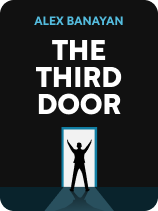

This article is an excerpt from the Shortform book guide to "The Third Door" by Alex Banayan. Shortform has the world's best summaries and analyses of books you should be reading.
Like this article? Sign up for a free trial here.
How do people like Steven Spielberg and Bill Gates succeed? What lessons from their lives and careers can you apply to your own?
In The Third Door, Alex Banayan writes that success is like a nightclub with three doors. He argues that the third door is the best—and really, only—route to getting ahead of the crowd. He learned this from interviewing (and trying to interview) several wildly successful people.
Continue reading for an overview of Banayan’s book, and find out what “the third door” is.
Overview of The Third Door by Alex Banayan
In The Third Door, Alex Banayan compares success to a nightclub that has three doors. The first is the main entrance, through which you enter by working hard and playing by the rules. The line to this door is crowded and moves slowly. The second door is reserved for billionaires and celebrities and is off-limits to the ordinary person. In The Third Door, he focuses on the last option—the door that allows regular folk to achieve extraordinary things by skipping the line, finding hidden opportunities, and thinking outside the box.
In the middle of his studies as a pre-med student, Banayan discovered he no longer had a passion for his chosen track of becoming a doctor. He began wondering what other people who’d gone on to become successful had done when they were in the same stage of life: young, inexperienced, and without a firm plan for their careers. Where had they found their inspiration? What allowed them to break through the ranks of their peers and become exceptional?
To find out, he dropped out of college to pursue what he admitted was an irrational, overly ambitious goal: to secure interviews with some of the world’s most successful, famous people and glean insights as to how they got there. This book is a compilation of what he learned not only from the people he interviewed but also from the process of pursuing them, as, even when he couldn’t land interviews, he learned from his setbacks.
Each interviewee had different stories and insights, but their underlying messages often overlapped. We’ll look at some of the themes he came across:
- Get help from others.
- Be persistent.
- Establish your credibility.
- Follow your own path.
- Let your values guide you.
- Work hard today for gains tomorrow.
- Don’t let setbacks derail you.
Get Help From Others
Throughout the book, Banayan discovers repeatedly that to become successful, you need to reach out to others for help. He first learned the value of asking for help when he sought funding for his book by competing on The Price Is Right, a US television show in which contestants guess the prices of various items. He wasn’t very familiar with the show, and so didn’t know what prices to guess. However, he asked the audience for their opinions and by doing so, came up with the winning answer. The experience taught him that people are generally happy to help you if you only ask.
Another way people are happy to help, Banayan discovered repeatedly, is by providing a personal, inside connection to an industry. He finds that having an inside connection is one of the most effective ways you can further your career because such a person allows you access to opportunities you otherwise wouldn’t have. Entrepreneur Elliott Bisnow and filmmaker Steven Spielberg both had insights on the importance of finding an inside connection.
Elliott Bisnow: Find a Mentor
Serial entrepreneur Elliott Bisnow, who rose to fame organizing celebrity-filled charity conferences, taught Banayan that one of the best ways to get help is to find a mentor. A mentor is an inside person who can not only introduce you to useful networking connections but can also guide you through tricky decisions and give you valuable advice based on their experience. Bisnow took Banayan under his wing as a mentee, and through his valuable insights, Banayan was able to get in touch with many of the people he interviewed.
Steven Spielberg: An Inside Connection Can Get You Noticed
Banayan argues that Steven Spielberg, the award-winning director of some of Hollywood’s biggest blockbusters, including E.T., Jurassic Park, the Indiana Jones trilogy, and Saving Private Ryan, can credit his success to an inside connection he developed early in his career.
Chuck Silvers, a Universal Studios employee, ran into Spielberg one day as Spielberg was touring the Universal lot and took a liking to him. Silvers wrote him a pass that allowed him to return to the lot repeatedly, and later, he actively advised him. He told Spielberg to make a short film and then showed it to the vice president of production at Universal TV, who subsequently offered Spielberg a seven-year contract.
Banayan writes that Spielberg was undeniably talented, and, without that talent, his success wouldn’t have happened. But he notes that countless aspiring directors are also talented—what set Spielberg on his trajectory was that early inside connection.
Be Persistent
To write his book, Banayan had to be persistent in tracking down famous people over several years. One lesson he learned from this process was that although business books tout endless, relentless persistence, it’s possible to take persistence too far—in several cases, the people he pursued blacklisted him, or nearly did, because his persistence crept over the line into harassment. He learned that it’s important to know when to pull back and that you should remain professional and recognize when you’re going too far.
Dean Kamen: Try Lots of Solutions, but Strategically
Inventor Dean Kamen gave Banayan insights on how to be strategically persistent so as to be efficient. Kamen invented the Segway and scores of other products, from insulin pumps to water purifiers. He held over 400 patents, was a member of the National Inventors Hall of Fame, and produced a TED Talk that garnered over a million views.
As an inventor, Kamen lived persistence: trying things that failed until discovering something that worked. He came up with a metaphor for persistence: kissing frogs. Based on the princess and the frog fairy tale, it describes a mentality by which you kiss frogs (potential solutions to your problem) until one of them reveals itself as a prince—the right solution.
Though Kamen encourages people to kiss many frogs, he acknowledges no one has the time or resources to kiss every frog available. He offered advice on how to kiss frogs, or pursue ideas, as efficiently as possible.
First, ask yourself if your goal is truly feasible: Does it contradict a law of physics? Is there a fundamental flaw in your product’s idea? Examining your idea for feasibility will prevent you from wasting time pursuing an inherently unworkable solution.
Then, sort your “frogs” into categories, so that instead of blindly kissing every frog possible, you can eliminate swaths of frogs by determining if a type of frog is unworkable. This will save you time.
Finally, if you’re having trouble finding the right frog, rethink the questions you’re asking. If you come at your problem from a new direction, the solution may appear.
Sugar Ray Leonard: Let an Inner Desire Be a Source of Strength
World champion boxer Sugar Ray Leonard also had insight into how to be persistent. Sugar Ray grew up in poverty and saw boxing as a way to better his life. However, he was smaller and less experienced than many of the kids in his neighborhood, so he set out to develop an edge by being more disciplined and more driven than them.
The scrappiness he developed as a child stuck with him into adulthood, and he related how he learned to tap into a “hidden reservoir” of strength to get through difficult fights. This reservoir was a source of inner desire that would propel him forward even when the odds were stacked against him—in other words, it motivated him to stay persistent.
By tapping into this desire, he could move past any doubts he might have. He noted that doubts come from the mind and work against the desires of the heart. But, he could align his heart and mind by focusing on his inner desire and therefore push past adversity.
Establish Your Credibility
Banayan purposefully chose interviewees who had, like him, started their careers as unknowns, and therefore faced a lack of credibility as they tried to get established. Several of the people he spoke with had advice on how to convince others to invest in you before you have a proven track record.
Tim Ferriss: Borrow Credibility
Tim Ferriss, entrepreneur, life coach, and author of The 4-Hour Workweek, a best-selling book about how to achieve success with minimal effort, told Banayan that an effective way to gain credibility is to borrow it from a more credible source.
To do so, volunteer for credible nonprofits or write for recognized publications. By doing so, you can associate your name with their expertise.
Bill Gates: Know Your Stuff
When Bill Gates, co-founder of Microsoft, was trying to close a deal with IBM in 1980, he faced a credibility problem. IBM was the world’s largest tech company at the time, and landing a deal with them would allow Microsoft to dominate the tech field for decades. But, he was the youthful-looking head of an unproven startup. He had to convince IBM executives that he was a serious player in the field and could be trusted with their business. To do this, he went into their meeting armed with knowledge not only about his product but also about IBM itself.
Know Your Product
Gates convinced IBM executives of his expertise in his product by talking fast and overwhelming them with detailed, technical answers to questions they raised. By discussing in-depth aspects of programming and software, he made it known that his knowledge outpaced his youthful looks.
Know Your Client
Gates also leveraged his knowledge of IBM’s desires and fears to secure a more favorable contract than would have been expected of his new and inexperienced company.
Desires: He knew IBM valued speed so he emphasized how fast his company could deliver—even deliberately overpromising what Microsoft was capable of at the time. He did so knowing that if he said what they wanted to hear, they’d be more inclined to work with his company.
Fears: Gates knew IBM feared potential lawsuits, and he used that knowledge to secure what he wanted, which was to keep the source code of his product a secret. He implied that if he disclosed the code to them and it was leaked, they’d be liable for billions of dollars. Fearful of this possibility, they agreed to his terms, even though normally, IBM, as the company with more leverage, would have been expected to extract the source code from Gates as part of the deal. Gates was thus able to establish his company as the one with more power in the negotiation, despite the fact that it was far smaller and less experienced.
Maya Angelou: Fake It—Then Be Sure to Make It
Poet, writer, activist, professor, and Grammy Award-winner Maya Angelou told Banayan her secret to appearing credible when starting out: Trust your capabilities, oversell your existing skills, and then work hard to improve those skills.
When Angelou applied for a job at a newspaper early in her career, she lied about her credentials and experience. She told Banayan that she promised the interviewers what she felt she needed to so that she could get the job, and she trusted that she’d be able to later learn the skills she’d promised. Then, she made sure she did—she spent lots of time at the library studying and learning until she had developed the expertise she’d claimed to have.
Follow Your Own Path
One lesson that Banayan repeatedly came across was that, even if you copy everything someone else has done, you can’t expect to replicate their success. This is because what works for one person won’t work in the same way for another person—there will be different factors and details that make it impossible to fully follow someone else’s path. Instead, you have to figure out what path will lead you to your own, unique success. What can you do that will leverage your particular strengths, skills, and circumstances?
Larry King: Don’t Copy Someone Else’s Style
Legendary interviewer Larry King told Banayan that the secret to getting good interviews with people was to be comfortable with who you are and not imitate the style of others. What makes another person successful might not work for you because each person’s style reflects their individual, unique way of seeing the world.
King argued that it’s only when you’ve adopted a style that reflects who you truly are that you’ll be able to genuinely connect with other people. And it’s only when you’ve established a genuine connection that they’ll open up to you.
Warren Buffett: Pay Attention to What Others Overlook
Banayan wasn’t able to secure a private interview with Warren Buffett, the legendary investor and chairman of financial firm Berkshire Hathaway, one of the most valuable companies in the world. However, Banayan read many books about Buffett and attended a shareholder’s meeting where he was able to ask him a few questions when Buffett took questions from the audience.
One of the main insights he gathered from Buffett’s wisdom was that you should pay attention to details that others overlook, and in doing so, follow your own path instead of following the crowd. Banayan credits much of Buffett’s success to his habit of “reading the footnotes”—scouring information for details that others miss. He notes that “reading the footnotes” encapsulates Buffett’s approach to life in general: It requires you to put in extra effort and dig deeper than others, seeing what some might consider a boring task (reading footnotes) as the real secret to success, as it leads to overlooked insights.
Let Your Values Guide You
Banayan heard from several of his interviewees how important it was to know your values and to design your life’s choices around them.
Steve Wozniak: Follow Your Own Values
When Banayan met with Steve Wozniak, the co-founder, along with Steve Jobs, of Apple, he found someone who didn’t fit the mold of an extremely successful businessperson: Wozniak defined success not by typical hallmarks like power, fame, or wealth, but by how his actions aligned with his values and how that led to personal happiness.
Wozniak said that society expects people to pursue power and money, but he decided early in his career that those goals wouldn’t make him happy. Instead, he had two goals: to create something—through engineering—that would benefit the world, and to live his life “on his own terms”: In other words, to do things he wanted to do rather than what society expected him to do.
To accomplish those goals, he lived according to his personal values. As such, he turned down executive positions at Apple, choosing instead to remain an engineer—a role that made him happier.
It also meant being honest and treating people well. One incident that showed this in action was when he discovered that Jobs had denied stock options to some of Apple’s earliest workers before the company’s public offering. Wozniak righted this wrong by gifting them some of his own shares. These shares, which he could have kept for himself, went on to make millions.
Jessica Alba: Focus on What Ultimately Matters Most—Life
Jessica Alba found success both as a leading actress in Hollywood and as the founder of a billion-dollar startup, The Honest Company. She told Banayan that what drove her, particularly with regard to her business, was her sense of mortality: her awareness of life, death, and health.
She came to appreciate the importance of life and health after she became a mother. This was especially true because she’d witnessed numerous family members go through cancer and Alzheimer’s, and after the birth of her child, she developed a strong desire to stay alive and healthy for the sake of her growing family.
When her son was young, Alba couldn’t find baby products without allergens and harmful chemicals. Inspired by this difficulty, she set out to create a company that would fill that gap in the market. She saw it as a way to give people more control over their health—she noted that a person’s health is affected by a combination of many things, but at the very least, we can control what we put in our bodies and what we bring into our homes. Because many other people also share these same values—fears of death and illness and desire for control over health—her company struck a chord with customers and launched her to success.
Tony Hsieh: Be Honest With Yourself About Your Motivations
Tony Hsieh, founder of online clothing store Zappos and author of the best-selling Delivering Happiness, had insights on values that surprised Banayan: He said it’s important to acknowledge your true motivations for completing a project, even if those motivations include things like vanity or money—egotistical values most people dismiss as superficial and not worth pursuing.
He argues that, while ego can be unhealthy, it’s OK to let ego be part of your motivation as long as it’s not the only thing driving you. Wanting the recognition or prestige that comes with success is a natural human desire, and instead of denying that such things are important to you, you should accept that such values can coexist with other, more worthwhile, values like wanting to help people.
When he published Delivering Happiness, Hsieh was honest with himself that he wanted the book to hit the bestseller list because it appealed to his ego. Acknowledging that aspect of his motivations helped him choose the right tactics to launch the book successfully and allowed him to then succeed with his other motivations, which included making a difference in people’s lives—a deeper, more altruistic motivation that coexisted with his egotistical motivations.
Work Hard Today for a Payoff Tomorrow
Several of Banayan’s interviewees emphasized the importance of working extra hard early in your career, arguing that the long-term gains you’ll earn are worth the effort and the sacrifice of short-term comfort. Two interviewees in particular who made that attitude a cornerstone of their careers were Grammy Award-winning rapper Pitbull and Microsoft executive Qi Lu.
Pitbull: Always Be Learning
Armando Perez, better known as Pitbull, who has produced award-winning music in multiple genres and started his own charter school, told Banayan that his secret to success is his willingness to approach any new venture with the mindset of an intern: be willing to work a low-wage, low-level job to learn about an industry from the bottom up.
Pitbull argues that when you do menial tasks and function as an assistant to others, you can get a foot in the door and gain access to insights and wisdom from experienced people. Even if you’re already successful in a different field, you should be ready to start at the bottom in any new field you approach. By constantly learning in this way, you’ll ultimately be a better executive because you’ve learned how the business works at every level.
Qi Lu: Be Disciplined
Banayan asked engineer Qi Lu, who grew up in extreme poverty in rural China but rose to hold executive positions at Yahoo, Microsoft, and other tech firms, how he was able to achieve exponential social mobility. Lu explained that he was extremely disciplined and that he sacrificed immediate comfort for long-term success.
He maintained a rigorous routine, running five miles every morning, eating small meals of fruits and vegetables throughout the day, and working 18 hours a day, six days a week. He also trained himself to sleep just four hours a night, giving him, over the course of a year, an extra two months of time (compared to people who sleep eight hours a night) with which he could learn new skills and work on projects.
He said that his discipline allowed him to get more out of his day than others, and therefore he was more prepared to jump on opportunities when they presented themselves.
Don’t Let Setbacks Derail You
Many of the people Banayan interviewed overcame difficult challenges in their lives and their careers. Lady Gaga and Quincy Jones both gave him insights on how to bounce back from setbacks so that you don’t derail your progress.
Lady Gaga: See Your Mistakes as Strengths
Banayan wasn’t able to sit down with Lady Gaga for an official interview, but he did meet her briefly and, through a mutual acquaintance, became involved in planning her media response to the criticism of her recently released album. The lesson he learned from how she handled that criticism was that if you have a strong sense of your values, you can spin your failures as successes as long as they align with those values.
The phenomenal success of her first two albums made Gaga a worldwide star, but critics panned her third album, ARTPOP, and sales were low. For several months after the album’s release, Gaga struggled to respond to this criticism, and the negative reviews were hard on her. However, she ultimately realized that the unusual character of her album—which is what prompted the negative reviews—was consistent with her brand of always defying expectations. Since her previous albums had been so well-received, it was fitting that she then release an album that appealed more to a fringe audience.
By embracing the message that the low sales and bad ratings of the album actually reflected its underlying strengths, Gaga was able to emerge from the experience with a sense that she was in control of the narrative. She even ramped up the strangeness of the album by making all-the-more bizarre performances, including having someone vomit on her on stage. She publicly compared this strangeness to Andy Warhol’s art, thus positioning her album alongside recognized great art.
Jane Goodall: Women Face Different Pressures
When Banayan sat down with primatologist Jane Goodall, he was confronted with a challenge that his male interviewees hadn’t had to face: sexual harassment. His lesson from this encounter was less about how to recover from these kinds of challenges, and more about his own recognition that they happen—before his conversation with Goodall, he didn’t consciously realize that women face unique disadvantages in the workplace.
Early in her career, Goodall landed a job as an assistant to Louis Leakey, a renowned paleoanthropologist with valuable knowledge and connections. Leakey was in a position to greatly further Goodall’s career, but he made sexual advances to her, putting her in a difficult position: If she rejected his advances, would he block her career progression?
Fortunately, Leakey stopped making advances when Goodall made it clear she wasn’t interested. He went on to fund her studies, which allowed her to live in the jungle and make the discoveries that changed science’s understanding of primates.
Banayan had a difficult time understanding Goodall’s attitude toward the experience. She brushed it off as just “something that happens,” which clued him in to the different dynamics women face in the workplace, and the fact that they must successfully navigate obstacles that men don’t.
Quincy Jones: Focus on the Journey, Not the Destination
Banayan’s interview with legendary music, film, and television producer Quincy Jones taught him a healthy way to recover mentally and emotionally from mistakes and setbacks: Jones argued that the important aspect of your pursuit of success is the journey itself, not the end result, and that, if you approach your career with that attitude, you’ll see mistakes as a step along the way instead of an ending point. In this way, you should focus on growth and effort, not outcomes.
Jones said that when you accept mistakes as part of the process, you’ll stop being afraid to make them, which can help keep you motivated to get through difficult times. If you’re afraid to make a mistake, you won’t challenge yourself, which will limit how much you achieve.
Banayan realized that this lesson applied to his journey in writing his book. He’d endured many failures and had made many mistakes. But those mistakes had taught him more than anyone’s wisdom had taught him.

———End of Preview———
Like what you just read? Read the rest of the world's best book summary and analysis of Alex Banayan's "The Third Door" at Shortform.
Here's what you'll find in our full The Third Door summary:
- That there are three doors in life—but most people only know about two
- Insights, tricks, and motivations to help you find your path to success
- Advice from some of the world's most successful people






